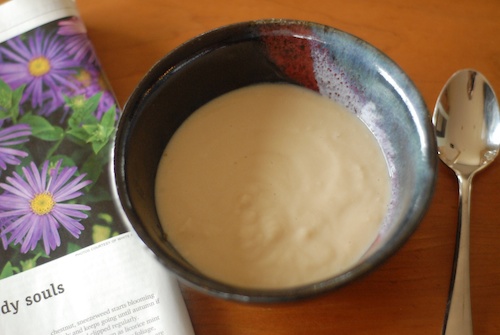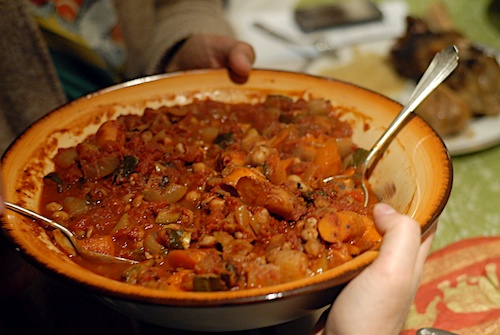
my friend’s chickens
I hope this blog is a great resource for both purely vegetarian families and ‘flexitarians.’ I thought some might wonder why this largely vegan blog has the occasional recipe using eggs, fish, or dairy, so here’s the evolution of our family’s eating habits.
Becoming Vegetarian
I became a vegetarian at age 14 after a visit to my uncle’s pig farm. I’m sure it was idyllic compared to today’s factory farms. While the adults chatted in the house I spent the afternoon in the barn, leaning over the rail of each hay-filled stall to watch the piglets nurse, sleep, and gambol around their mother sows.
When I was called in to dinner, I didn’t want the ham. It was that simple. I had pet fish, so eating fish didn’t appeal to me, either. My mom made me bean soup to make sure I got enough protein. It was basically beans, salt, and water, but I could have cooked something else up if I’d been motivated enough. My younger sisters followed after me and eventually became vegetarian, too. My husband, who I hadn’t yet met, independently became vegetarian for similar reasons at about the same age.
Raising Children
When I had children, naturally I raised them vegetarian. They had mother’s milk only at first, gradually adding other foods to their diet. Tall, broad-shouldered boys, they were big babies who grew and put on weight well. Because of their colic I had to cut dairy products out of our diet, and with three kids, there was an extended time when we weren’t able to cook with any dairy at all. We always used eggs. After the first years each of them seemed to be able to tolerate dairy and we added it back in.
Now as middle-aged adults my husband and I don’t tolerate dairy as well anymore and rarely have it, though our young adult children do. We keep a couple blocks of cheese on hand for occasional use, Parmigiano Reggiano or the cheaper Grana Padano, and usually some other artisan cheese (Manchego at the moment). Kefir seems more agreeable to me than yogurt or other dairy. I’ve have relatives with celiac so I’ve also experimented with cutting out wheat- I’m not sure honestly whether or not that has improved my health, but it may have.
I’ve paid attention all along to choosing healthy fats, reading labels and avoiding hydrogenated oils. For a long time the only oils we used in our cooking were extra virgin olive oil, butter, and sesame oil. Now we use expeller-pressed canola or grapeseed oil when something flavorless is required, but mostly stick with olive oil and nut oils. Butter’s still on the menu, but it’s rare. I didn’t have any problem using butter even when we were otherwise non-dairy. It must be the protein component of the milk that has caused problems for our family.
Adding Fish
In the last decade, after more than two decades of being vegetarian, our family started eating that Northwest signature food, salmon. I can’t give one defining reason why we did this. Our town has a festival each fall to celebrate the return of the salmon and they are a part of the culture here, but that didn’t necessitate our eating them. We eat wild salmon from the sustainable Alaskan fishery, and we have it maybe once a week, though that varies. There are no factory farming issues as with land animals, but there’s still the fact that the salmon has a nervous system comparable to land animals and is killed. It doesn’t jibe with being an ethical vegetarian, so I don’t claim anymore that I am.
There really is no ethically consistent philosophy to eating fish but not other animals, and that’s a big reason why our older children began eating other meat in college. They were already eating fish, so it didn’t make sense to them to avoid other meat. Still, people often ask them if they are vegetarian since most of their food choices are produce-based.
From a health standpoint, the salmon has pros and cons, the cons being mercury and other toxins. On the pro side, the salmon is a handy source of some of the nutrients found in animal food, especially now that we eat so little dairy. If we were vegan, I’d look into supplementing for DHA, B12, and maybe some other things, and it would be possible to eat quite healthfully with a little care. (Like so many nutrition topics, there are conflicting studies about the EPA and DHA status of vegans: it may be fine. In any case, there are vegan supplements available.)
Vegetarian Choices
We eat free range eggs. In the summer I buy them from a neighbor who has chickens, but her chickens don’t lay as much in the winter, so I have to carefully shop at the food co-op then for eggs that are actually free range. We use eggs as an ingredient in things like pudding and have occasional egg-based dishes too. We get a lot of protein from legumes, soy, and vegetables.
So that’s where we’re at. I have no plans to add land animals into our diet, and I wouldn’t want to even in the unlikely case that there were health benefits for me. I might not be completely vegetarian anymore, but when I see a cattle truck on the freeway loaded with cows, goats, or sheep, I’m still glad that we don’t eat them. There’s something about them being tame, domestic animals that makes killing them seem like a betrayal of trust.







{ 0 comments… add one now }